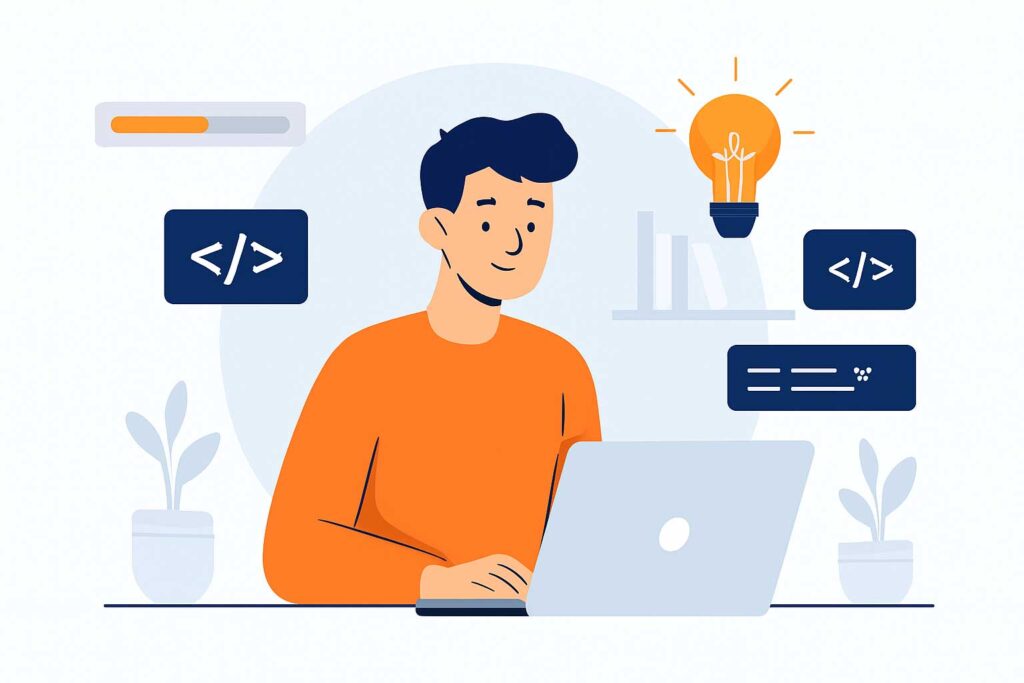Table of Contents:
What is Practice? – Meaning, Definition, and Importance
Practice is the act of repeatedly performing an activity to improve your skill, efficiency, and confidence. It’s not just repetition — it’s a focused and consistent effort to refine your performance over time.
In the context of programming, learning, or personal growth, practice transforms theoretical knowledge into real-world expertise. It turns a beginner into a professional, and a learner into a leader.
As the saying goes:
“Practice doesn’t make perfect. Perfect practice makes progress.”
Understanding the Real Meaning of Practice
At its core, practice means doing something regularly to become better at it. It can apply to sports, music, studies, or software development — any skill that requires consistency.
When you practice, you:
- Strengthen your knowledge
- Correct mistakes through repetition
- Gain speed and confidence
- Build habits that lead to mastery
Importance of Practice in Learning and Skill Development
1. Builds Confidence and Consistency
When you keep practicing, you understand your strengths and weaknesses. It boosts your confidence and helps you perform better under pressure.
2. Converts Knowledge into Action
Practice helps bridge the gap between what you know and what you can do. For example, learning programming logic is easy — but applying it daily through coding practice creates real understanding.
3. Encourages Continuous Improvement
Each repetition refines your skills. Practice helps you notice small details, find better methods, and improve step-by-step.
4. Helps in Problem Solving
Developers who practice coding regularly develop sharper problem-solving skills. They can debug faster, think logically, and write efficient code.
5. Leads to Expertise
The more you practice, the deeper your understanding becomes. Mastery in any field — music, art, sports, or software — is built on thousands of hours of deliberate practice.
what is practice, meaning of practice, importance of practice, types of practice, how to practice effectively, daily learning habits, developer practice tutorial, coding practice for beginners, improve skills through practice
Types of Practice – Which One Suits You Best?
Deliberate Practice
Focused and intentional improvement on specific skills. Used by professionals to master difficult tasks.
Repetitive Practice
Performing the same activity multiple times to build muscle memory and consistency.
Reflective Practice
Analyzing your actions after every session — what went right, what didn’t, and how to improve next time.
Collaborative Practice
Working with others, learning from feedback, and growing through shared experience — ideal for coding teams or study groups.
How to Practice Effectively
- Set Clear Goals: Know what you want to achieve with each session.
- Start Small: Focus on one task or topic at a time.
- Track Progress: Keep a record of what you’ve learned.
- Seek Feedback: Ask mentors, teachers, or peers to review your work.
- Stay Consistent: Even 30 minutes of daily practice creates long-term growth.
For developers, using platforms that provide real-time coding challenges and tutorials — like PHPOnline’s learning tools — helps you stay disciplined and improve faster.
Practice for Developers and Programmers
For developers, practice means coding regularly to master logic, syntax, and debugging.
It involves:
- Solving real-world programming challenges
- Building small projects to test concepts
- Reviewing code to improve efficiency
- Learning from other developers’ best practices
Visit our [Developers Best Practices Tutorial] page to explore how consistent practice improves code quality and professional skills.
Benefits of Regular Practice
- Enhances memory retention
- Improves speed and accuracy
- Reduces errors over time
- Builds resilience and discipline
- Creates mastery and confidence
Practice is not about perfection — it’s about continuous progress.
Frequently Asked Questions (FAQ)
Q1. What is the true definition of practice?
Practice means consistent effort to improve your skill or performance through regular repetition and learning from mistakes.
Q2. Why is practice important in coding and development?
Because programming mastery comes only through continuous problem-solving, testing, and debugging — all achieved through regular practice.
Q3. How much practice is needed to master a skill?
Experts suggest that consistent daily practice for weeks or months builds deep skill proficiency. Quality matters more than quantity.
Q4. Can practice replace talent?
Yes. Talent gives you a start, but practice builds expertise. Even the most skilled professionals grow through consistent effort.
Q5. What is the difference between practice and repetition?
Repetition is doing something again and again. Practice is intentional repetition with improvement in mind.



